Skyfall
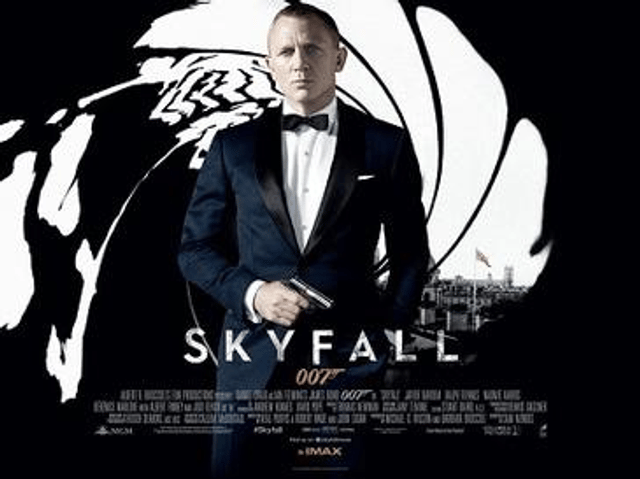
Skyfall

| Skyfall | |
|---|---|
| Directed by | Sam Mendes |
| Produced by |
|
| Screenplay by |
|
| Based on | James Bond by Ian Fleming |
| Starring |
|
| Music by | Thomas Newman |
| Cinematography | Roger Deakins |
| Edited by |
|
Production company | |
| Distributed by | Sony Pictures Releasing[2] |
Release date |
|
Running time | 143 minutes[3] |
| Country |
|
| Language | English |
| Budget | $150–200 million |
| Box office | $1.109 billion[4] |
Skyfall is a 2012 spy film and the twenty-third in the James Bond series produced by Eon Productions. The film is the third to star Daniel Craig as the fictional MI6 agent James Bond and features Javier Bardem as Raoul Silva, the villain. It was directed by Sam Mendes and written by Neal Purvis, Robert Wade, and John Logan, and features the theme song "Skyfall", written and performed by Adele. It was distributed by Metro-Goldwyn-Mayer (MGM) and Columbia Pictures.[5]
The story centres on Bond investigating an attack on MI6; the attack is part of a plot by former agent Raoul Silva to discredit and kill M as revenge for having abandoned him. The film sees the return of two recurring characters after an absence of two films: Q, played by Ben Whishaw, and Moneypenny, played by Naomie Harris.
Mendes was approached to direct after the release of Quantum of Solace in 2008. Development was suspended when MGM ran into financial trouble, and did not resume until December 2010. The original screenwriter, Peter Morgan, left the project during the suspension. When production resumed, Logan, Purvis, and Wade continued writing what became the final version. Filming began in November 2011, primarily in the United Kingdom, with smaller portions shot in China and Turkey.
Skyfall premiered in London at the Royal Albert Hall on 23 October 2012 and was then released in the United Kingdom on 26 October and the United States on 9 November. It was the first James Bond film to be screened in IMAX venues, although it was not filmed with IMAX cameras. The release coincided with the 50th anniversary of the series, which began with Dr. No in 1962. Skyfall was very well-received by critics, who praised its screenplay, acting (particularly by Craig, Bardem, and Dench), Mendes' direction, cinematography, musical score, and action sequences. It was the 14th film to gross over $1 billion worldwide, and the first James Bond film to do so. At the time of its release it became the seventh-highest-grossing, the highest-grossing film in the UK, the highest-grossing film in the series, the highest-grossing film worldwide for both Sony Pictures (until being surpassed by Spider-Man: Far From Home in 2019) and MGM, and the second-highest-grossing film of 2012. The film won several accolades, including two Academy Awards, two BAFTA Awards and two Grammy Awards.
A sequel, Spectre, was released in November 2015, with Craig reprising his role and Mendes returning to direct.
| Skyfall | |
|---|---|
| Directed by | Sam Mendes |
| Produced by |
|
| Screenplay by |
|
| Based on | James Bond by Ian Fleming |
| Starring |
|
| Music by | Thomas Newman |
| Cinematography | Roger Deakins |
| Edited by |
|
Production company | |
| Distributed by | Sony Pictures Releasing[2] |
Release date |
|
Running time | 143 minutes[3] |
| Country |
|
| Language | English |
| Budget | $150–200 million |
| Box office | $1.109 billion[4] |
Plot
In Istanbul, MI6 agents James Bond and Eve Moneypenny pursue mercenary Patrice, who has stolen a hard drive containing details of undercover agents. As Bond and Patrice fight atop a moving train, M orders Moneypenny to shoot Patrice; Moneypenny inadvertently hits Bond, who falls into a river. Bond is presumed dead and Patrice escapes with the hard drive.
Three months later, due to a public inquiry into M's handling of the stolen hard drive, M is pressured by Gareth Mallory, the chairman of the Intelligence and Security Committee of Parliament and a former SAS officer, to retire. She resists, claiming she is still useful, but MI6's servers are hacked and M receives a taunting computer message moments before the MI6 building explodes. Bond, who used his presumed death to retire, learns of the attack and returns to London. Although he fails a series of physical, medical and psychological examinations, M approves his return to the field, ordering him to identify Patrice's employer, recover the stolen hard drive, and kill Patrice. He meets Q, MI6's new quartermaster, who gives him a radio beacon and a Walther PPK pistol.
In Shanghai, Bond follows Patrice into a skyscraper but is unable to prevent him from killing a target. The two fight, but Patrice falls to his death before Bond can learn his employer's identity. Bond finds a casino token that Patrice intended to cash in for the assassination, which leads him to a casino in Macau. There, Bond is approached by Sévérine, Patrice's accomplice, and asks to meet her employer. She warns him that he is about to be killed by her bodyguards, but promises to help Bond if he will kill her employer. Bond thwarts the attack and joins Sévérine on her yacht, the Chimera. They travel to an abandoned island off the coast of Macau where they are taken prisoner by the crew and delivered to Sévérine's employer, Raoul Silva. Silva, once an MI6 agent, has now turned to cyberterrorism and orchestrated the attack on MI6. Silva kills Sévérine, but Bond captures Silva for rendition to Britain.
At MI6's new underground headquarters, Q attempts to decrypt Silva's laptop, but inadvertently gives it access to the MI6 servers, which allows Silva to escape. Q deduces that Silva, who has disguised himself as a police officer, wanted to be captured as part of a plan to kill M, whom he resents for disavowing and betraying him to the Chinese government in 1997. Bond gives Silva chase through the London Underground, and thwarts Silva's attack at a Parliament inquiry where M is present.
Instructing Q and Bill Tanner to leave an electronic trail for Silva to follow, Bond takes M to Skyfall, the Bond family estate in the Scottish Highlands. They meet Skyfall's gamekeeper Kincade, and together the trio set up a series of booby traps throughout the house. When Silva's men arrive, Bond, M, and Kincade manage to kill most of them, but M is wounded. Silva himself arrives by helicopter with more men and heavy weapons, so Bond sends M and Kincade through a priest hole to a nearby chapel. As the house is destroyed Bond escapes down the same tunnel and heads toward the chapel.
Silva survives the destruction of the house and follows Kincade and M to the chapel. He forces his gun into M's hand and presses his temple to hers, begging her to kill them both. Bond arrives and kills Silva by throwing a knife into his back, but M succumbs to her wounds and dies in Bond's arms. Following M's funeral, Moneypenny formally introduces herself to Bond and tells him she is retiring from field work to become secretary for the newly appointed M, whom Bond finds to be Mallory.
Cast
Daniel Craig as James Bond, agent 007.
Judi Dench as M, the head of MI6 and Bond's superior.
Javier Bardem as Raoul Silva (born Tiago Rodriguez),[6] an ex-MI6 operative-turned-cyberterrorist.
Ralph Fiennes as Gareth Mallory, chairman of the Intelligence and Security Committee of Parliament and a former SAS Lieutenant Colonel.
Naomie Harris as Eve Moneypenny, an MI6 field agent.
Bérénice Marlohe as Sévérine, Raoul Silva's associate and mistress.
Albert Finney as Kincade, the gamekeeper of the Skyfall estate.
Ben Whishaw as Q, the MI6 quartermaster.
Rory Kinnear as Bill Tanner, the MI6 Chief of Staff.
Ola Rapace as Patrice, a mercenary under Silva's command.
Helen McCrory as Clair Dowar MP
Production
Development
Production of Skyfall was suspended throughout 2010 because of MGM's financial troubles. Preproduction resumed following MGM's exit from bankruptcy on 21 December 2010; in January 2011, the film was officially given a release date of 9 November 2012 by MGM and the Broccoli family, with production scheduled to start in late 2011. Subsequently, MGM and Sony Pictures announced that the UK release date would be brought forward to 26 October 2012, two weeks ahead of the US release date, which remained scheduled for 9 November 2012.[7] The film's budget is estimated to have been between US$150 million[8][9] and $200 million,[4] compared to the $200 million spent on Quantum of Solace.[10] Skyfall was part of year-long celebrations of the 50th anniversary of Dr. No and the Bond film series. According to producer Michael G. Wilson, a documentary crew was scheduled to follow production of the film to celebrate the anniversary.[11]
Pre-production
After the release of Quantum of Solace in 2008, producer Barbara Broccoli commented that Skyfall, untitled at the time, may continue the plot of the Quantum organisation, introduced in Casino Royale and continued in Quantum of Solace.[12]
In August 2011 the Serbian newspaper Blic stated that Bond 23 would be entitled Carte Blanche and would be an adaptation of the recent continuation novel by Jeffery Deaver.[13] On 30 August Eon Productions officially denied any link between Bond 23 and Carte Blanche, stating that "the new film is not going to be called Carte Blanche and will have nothing to do with the Jeffery Deaver book".[14] On 3 October 2011 15 domain names including 'jamesbond-skyfall.com' and 'skyfallthefilm.com' were reported to have been registered on behalf of MGM and Sony Pictures by Internet brand-protection service MarkMonitor. This led to supposition in the media that the film had been given the name "Skyfall". These reports were not confirmed at the time by Eon Productions, Sony or MGM.[15] Skyfall was later confirmed as the title at a press conference on 3 November 2011, during which co-producer Barbara Broccoli said that the title "has some emotional context which will be revealed in the film".[16] The title refers to the name of Bond's childhood home "Skyfall", and the setting for the film's finale.[17]
Casting
The main cast of Skyfall was officially announced at a press conference held at the Corinthia Hotel in London on 3 November 2011,[18] 50 years to the day after Sean Connery was announced to play James Bond in the film Dr. No.[11] Daniel Craig returned as James Bond for the third time,[19] saying he felt lucky to have the chance to appear as 007.[20] Director Sam Mendes described Bond as experiencing a "combination of lassitude, boredom, depression [and] difficulty with what he's chosen to do for a living".[21] Judi Dench returned as M for her seventh and final appearance in the role.[22] Over the course of the film, M's ability to run MI6 is repeatedly called into question, culminating in a public inquiry into her running of the service.
Javier Bardem was cast as the film's principal villain, Raoul Silva, a cyberterrorist who is seeking revenge against those he holds responsible for betraying him.[23][24] Bardem described Silva as "more than a villain", while Craig stated that Bond has a "very important relationship" to Silva.[25] In casting the role, director Sam Mendes admitted that he lobbied hard for Bardem to accept the part. Mendes saw the potential for the character to be recognised as one of the most memorable characters in the series and wanted to create "something [the audience] may consider to have been absent from the Bond movies for a long time".[26] He felt that Bardem was one of the few actors up to the task of becoming "colourless" and existing within the world of the film as something more than a function of the plot.[27] In preparing for the role, Bardem had the script translated into his native Spanish to better understand his character, which Mendes cited as being a sign of the actor's commitment to the film.[28] Bardem dyed his hair blond for the role after brainstorming ideas with Mendes to come up with a distinct visual look for the character,[29] which led some commentators to observe a similarity between the character and WikiLeaks founder Julian Assange.[30][31][32] Bérénice Marlohe was cast as Séverine, a character who had been saved from the Macau sex trade by Silva and now works as his representative.[33][34] Marlohe described her character as being "glamorous and enigmatic",[19] and that she drew inspiration from GoldenEye villain Xenia Onatopp (played by Famke Janssen) in playing Séverine.[35]
Ralph Fiennes was cast as Gareth Mallory,[36] a former lieutenant colonel in the British Army and now the chairman of the Intelligence and Security Committee,[37] which gives him the authority to regulate MI6.[38] At the end of the film, Mallory becomes the head of MI6, assuming the title of M. During production, Fiennes stated that he could not say anything specific about the role other than that it was a "really interesting part which is really quite fun".[39] To play the returning character of Miss Moneypenny, Naomie Harris was cast.[32] Harris' role was initially presented as that of Eve, an MI6 field agent who works closely with Bond. Despite ongoing speculation in the media that Harris had been cast as Miss Moneypenny,[40][41] this was not confirmed by anyone involved in production of the film, with Harris herself even going so far as to dismiss claims that Eve was in fact Moneypenny, stating that "Eve is not remotely office-bound".[42] According to Harris, Eve "[believes] she is Bond's equal, but she is really his junior".[43] Another character returning to the series was Q, played by Ben Whishaw.[44] Mendes had initially declined to confirm which part Whishaw would play,[19] and later said the idea of the re-introduction was his, saying, "I offered ideas about Moneypenny, Q and a flamboyant villain and they said yes". To play the part of Kincade, Mendes cast Albert Finney.[45] The producers briefly considered approaching Sean Connery to play the role in a nod to the 50th anniversary of the film series, but elected not to as they felt Connery's presence would be seen as stunt casting and disengage audiences from the film.[46]
Crew
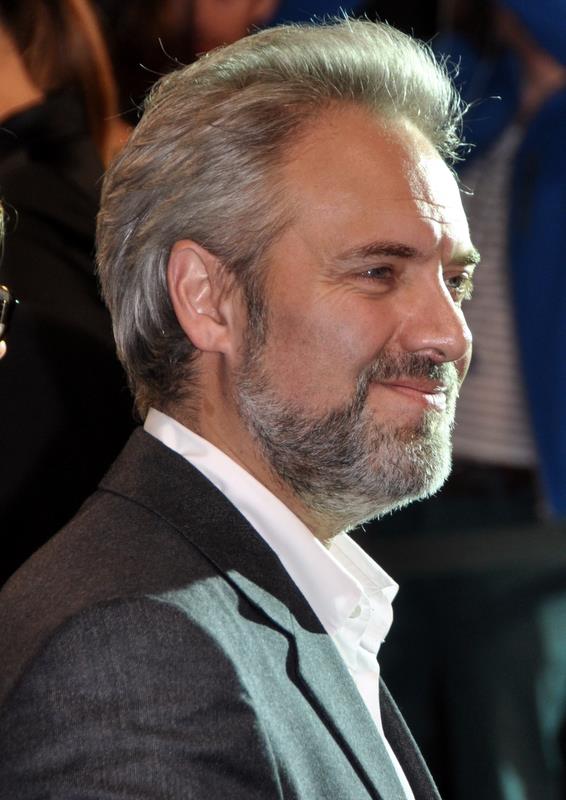
Director Sam Mendes at the film's premiere in Paris, October 2012
Skyfall was directed by Sam Mendes, who first signed on to the project shortly after Quantum of Solace was released, and remained on board as a consultant during the period of uncertainty surrounding MGM's financial situation. Mendes, who had previously worked with Craig on Road to Perdition, was approached after seeing Craig in a production of A Steady Rain. The two met after a performance, where Craig broached the subject of directing a Bond film for the first time.[47] Mendes was at first hesitant to accept the job as directing a Bond film had no appeal to him, but he did not reject the offer immediately because of Craig's involvement and enthusiasm for the project; Mendes described Craig's casting and performance in Casino Royale as being precisely what he felt the Bond franchise needed in its lead actor. He agreed to direct after meeting with producers Michael G. Wilson and Barbara Broccoli and seeing the early direction the film was going to take.[47] Speculation in the media suggested that Mendes had commissioned rewrites of the script to "[remove] action scenes in favour of 'characterful performances'" with the intention of bidding for an Academy Award.[48] Mendes denied the reports, stating that the film's planned action scenes were an important part of the overall film.[11]
Peter Morgan was originally commissioned to write a script, but left the project when MGM filed for bankruptcy and production of the film stalled; despite his departure, Morgan later stated that the final script was based on his original idea, retaining what he described as the film's "big hook".[49] Director Mendes adamantly denied this, stating that it was "just not true" and that Morgan's script treatment had been discarded once Mendes agreed to direct.[50] The final script was written by Bond screenwriting regulars Neal Purvis, Robert Wade and John Logan.[51] Logan recounted being brought into the project by his long-time friend Sam Mendes, describing the process between Mendes and the writers as "very collaborative", and that writing Skyfall was one of the best experiences he had had in scripting a film.[52] British playwright Jez Butterworth also provided uncredited contributions.[53]
Roger Deakins signed on as cinematographer, having previously worked with Mendes on Jarhead and Revolutionary Road.[54] Dennis Gassner returned as production designer, the costume designer was Jany Temime, Alexander Witt was director of the second unit, the stunt co-ordinator was Gary Powell and Chris Corbould supervised the special effects, while the visual effects supervisor was Steve Begg. All had worked on previous Bond films.[5] Daniel Kleinman returned to design the film's title sequence after stepping aside to allow graphic design studio MK12 to create the Quantum of Solace sequence.[55]
Location scouting
Sam Mendes and Barbara Broccoli travelled to South Africa for location scouting in April 2011.[56] With the film moving into pre-production in August, reports emerged that shooting would take place in India,[57] with scenes to be shot in the Sarojini Nagar district of New Delhi[58] and on railway lines between Goa and Ahmedabad.[59] The production crew faced complications in securing permission to close sections of the Konkan Railway.[60] Similar problems in obtaining filming permits were encountered by production crews for The Dark Knight Rises and Mission: Impossible – Ghost Protocol.[61] Permission was eventually granted to the Bond production crew; however, the production ultimately did not shoot in India.[62]
Filming
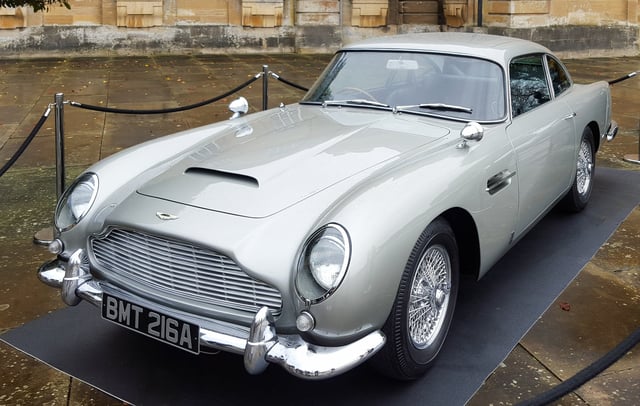
The Aston Martin DB5 featured in the film
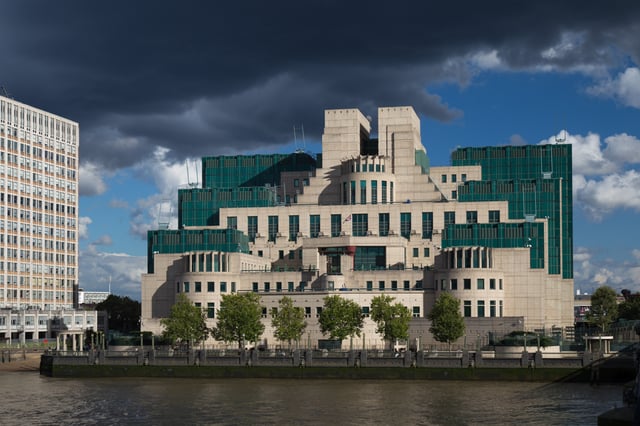
The MI6 Building in London
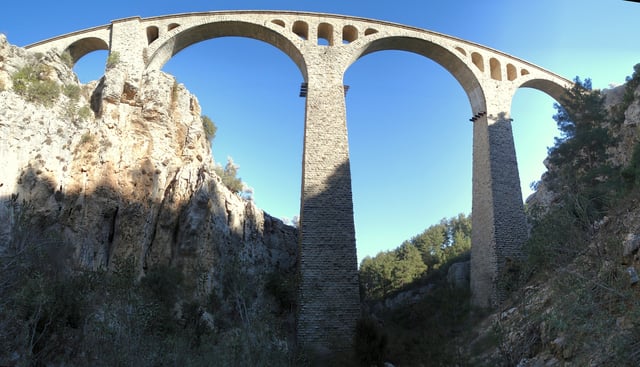
The Varda Viaduct was used for the scene in which Bond is shot.
Principal photography was scheduled to take up to 133 days,[63] although the actual filming took 128.[64] Filming began on 7 November 2011 in and around London,[11][65] with the cinematographer Roger Deakins using Arri Alexa digital cameras to shoot the entire film.[66] Scenes were shot in London Underground stations,[67] Smithfield car park in West Smithfield,[68] the National Gallery, Southwark,[69] Whitehall, Parliament Square,[70] Charing Cross station,[71] the Old Royal Naval College in Greenwich,[72] Cadogan Square[68] and Tower Hill.[73] St Bartholomew's Hospital[69] was used as the filming location for the scene in which Bond enters MI6's underground headquarters, while the Old Vic Tunnels underneath Waterloo Station in London served as the MI6 training grounds. For the meeting between Q and Bond, production worked during the National Gallery's closing hours at night. The Department of Energy and Climate Change was used in the scene when Bond stood on the roof near the end of the film.[68][74] The Vauxhall Bridge and Millbank were closed to traffic for filming the explosion at the MI6 headquarters at Vauxhall Cross.[74] Unlike The World Is Not Enough, which also featured an explosion at the building—which was filmed at a large-scale replica—the explosion in Skyfall was added digitally in post-production.[75] Shooting of the finale was planned to take place at Duntrune Castle in Argyll,[76] but was cancelled shortly after filming began.[77] Glencoe was instead chosen for filming of these scenes.[74] Although supposedly based in Scotland, Bond's family home of Skyfall was constructed on Hankley Common in Surrey[78] using plywood and plaster to build a full-scale model of the building.[79]
Production moved to Turkey in March 2012, with filming reported to be continuing until 6 May.[80] Production was expected to take three months in the country.[81] Adana stands in for the outskirts of Istanbul in the film.[82] A group of Turkish teenagers infiltrated a closed set in a railway sidings in Adana to film rehearsals of a fight scene on top of a train before being caught by security.[83] The train scene depicted in trailers showed the Varda Viaduct outside Adana. Bond stunt double Andy Lister dived backwards off the 300-foot drop for the scene. A crane was set up on a train carriage to hold a safety line.[74] Parts of Istanbul—including the Spice Bazaar, Yeni Camii, the Grand Post Office, Sultanahmet Square and the Grand Bazaar—were closed for filming in April.[80] Store owners in the affected areas were reportedly allowed to open their shops, but were not allowed to conduct business, instead being paid TRY750 ($418) per day as compensation.[80] Production faced criticism for allegedly damaging buildings while filming a motorcycle chase across rooftops in the city. Michael G. Wilson denied these claims, pointing out that the film crew had removed sections of rooftops before filming began and replaced them with replicas for the duration of the shoot; when filming finished, the original rooftops would be restored.[84] The production team negotiated with 613 part owners of the Calis Beach in Fethiye, to film along the coastline.[74]
Mendes confirmed that China would be featured in the film, with shooting scheduled to take place in Shanghai and "other parts" of the country.[11] John Logan asserted that production deliberately sought out locations that were "in opposition" to London with an exotic quality that made them "places for Bond to be uncomfortable".[74] Many scenes were not filmed on location in Shanghai. Instead, the Virgin Active pool in London's Canary Wharf acted as Bond's hotel pool in Shanghai,[69][74] and the entrance to London's fourth tallest building, Broadgate Tower, was also lit up to look like an office building there; for the aerial footage of Shanghai, the crew received rare access to shoot from a helicopter on loan from the Chinese government.[74] The interior of the Golden Dragon casino in Macau where Bond met Séverine was constructed on a sound stage at Pinewood Studios, with 300 floating lanterns and two 30-foot-high dragon heads lighting the set.[74] Additional scenes were filmed at Ascot Racecourse, standing in for Shanghai Pudong International Airport.[85][86] The first official image from the film was released on 1 February 2012, showing Daniel Craig on set at Pinewood, within a recreation of a skyscraper in Shanghai.[87]
Set reports dated April 2012 recorded that scenes would be set on Hashima Island, an abandoned island off the coast of Nagasaki, Japan.[88][89] In actuality, the scene was set on an unnamed island off the coast of Macau, though based on the real-life Hashima. Sam Mendes explained that the location was a hybrid of a set and computer-generated images.[90] Production chose to include the Hashima model after Daniel Craig met with Swedish film-maker Thomas Nordanstad while shooting The Girl with the Dragon Tattoo in Stockholm. Nordanstad, who produced a short documentary on Hashima Island in 2002 entitled Hashima, recalled Craig taking extensive notes on the island at the time of the meeting, but was unaware of his interest in it until Skyfall was released.[91]
The film was later converted into the IMAX format for projection in IMAX cinemas. Deakins was unaware that the film was to be released on IMAX until after he had made the decision to shoot the film with the Arri Alexa cameras, and was unhappy with the IMAX tests made from his footage as the colours "didn't look great".[66] After exploring the IMAX system further and discovering that the IMAX Corporation was using their proprietary re-mastering process, Deakins had further tests made without the process and found that "the images looked spectacular on the big IMAX screen", quelling his doubts about the format.[66]
Music
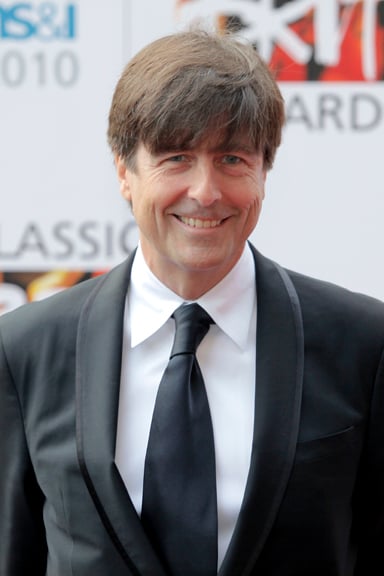
Thomas Newman composed the film's score.
Thomas Newman, who had previously worked with Sam Mendes as composer for American Beauty, Road to Perdition, Jarhead and Revolutionary Road, replaced David Arnold as composer,[92] becoming the ninth composer in the series' history. When asked about the circumstances surrounding his departure from the role, David Arnold commented that Newman had been selected by Mendes because of their work together, rather than because of Arnold's commitment to working with director Danny Boyle as composer for the Opening Ceremony of the 2012 Summer Olympics.[93] The soundtrack album was released on 29 October 2012 in the United Kingdom and on 6 November 2012 in the United States.[94]
In October 2012 British singer-songwriter Adele confirmed that she had written and recorded the film's theme song with her regular songwriter, Paul Epworth.[95][96] She later posted the cover for the "Skyfall" sheet music on Twitter, crediting the songwriting to herself and Epworth, with arrangements to both Epworth and orchestrator J. A. C. Redford.[97] The song was released online at 0:07 am BST on 5 October 2012, a day dubbed "James Bond Day" by the producers as it marked 50 years to the day of the release of Dr. No.[98]
The film also features Charles Trenet's 1938 song "Boum !" during scenes in which Silva shows Bond around his abandoned island, and The Animals' 1964 cover of John Lee Hooker's song, "Boom Boom" when Silva assaults Skyfall in the film's finale.[102]
Release and reception
The premiere of Skyfall was on 23 October 2012 at the Royal Albert Hall in London. The event was attended by Charles, Prince of Wales, and his wife Camilla, Duchess of Cornwall.[103] The film was released in the UK three days later on 26 October and into US cinemas on 8 November.[104] Skyfall was the first Bond film to be screened in IMAX venues[105] and was released into IMAX cinemas in North America a day earlier than the conventional cinema release.[106]
Skyfall attracted some criticism from the National Sexual Violence Resource Center which, without having screened the film, expressed concern that Bond "abuses his power and authority" in a scene that suggests Bond initiates sexual intercourse with Séverine, a former victim of sex trafficking.[107]
Box office
Skyfall earned $1.109 billion worldwide,[4] and at the time of its release was the highest-grossing film worldwide for Sony Pictures and the second-highest-grossing film of 2012.[108][109] On its opening weekend, it earned $80.6 million from 25 markets.[110] In the UK the film grossed £20.1 million on its opening weekend, making it the second-highest Friday-to-Sunday debut ever behind Harry Potter and the Deathly Hallows – Part 2.[111] It also achieved the second-highest IMAX debut ever behind The Dark Knight Rises.[110] The film set a record for the highest seven-day gross with £37.2 million, surpassing previous record holder Deathly Hallows – Part 2 (£35.7 million).[112] By 9 November 2012 the film had earned over £57 million to surpass The Dark Knight Rises as the highest-grossing film of 2012, and the highest-grossing James Bond film of all time in the UK.[113] After 40 days of release the total UK gross stood at £94.28 million, making Skyfall the highest-grossing film in the UK, surpassing the £94.03 million of Avatar.[114] By 30 December 2012, it had become the first film to gross more than £100 million ($161.6 million) in the UK.[115] Skyfall's box office receipts make it only the 14th film and first Bond film to gross over $1 billion, the seventh-highest-grossing film ever made at the time, pushing it past the inflation-adjusted amount of $1.047 billion earned by Thunderball.[116][117]
Skyfall set an opening weekend record in Switzerland ($5.3 million) and recorded the second-largest opening weekend of the year for a Hollywood film in India after The Amazing Spider-Man ($5.1 million), as well as grossing $14.3 million on its opening weekend in France.[118] In Austria, it achieved the second-highest opening weekend ever ($3.4 million) behind The Lord of the Rings: The Return of the King, while in Finland, it scored the largest opening weekend when excluding previews ($1.47 million).[119]
In North America, the film opened in 3,505 cinemas, the widest opening for a Bond film.[120] The film earned $2.4 million from midnight showings on its opening day and a further $2.2 million from IMAX and large-format cinemas.[120] CinemaScore polls reported that the average grade filmgoers gave the film was an "A" on an A+ to F scale.[121] Skyfall went on to gross $30.8 million on its opening day in the US and Canada,[122] and $88.4 million in its opening weekend, the biggest debut yet for a Bond film.[123] By the end of its theatrical run, the film earned $304,360,277 in the United States and Canada, making it the fourth-highest-grossing film of 2012 in these regions.[4][124]
Critical response
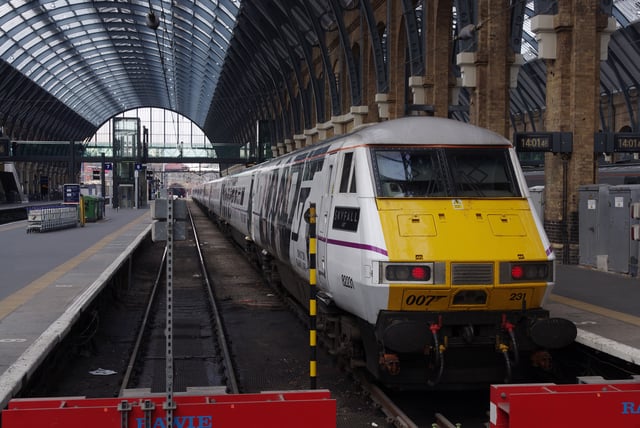
The UK DVD release of Skyfall was advertised by a train covered in 007 vinyls.
Skyfall received "generally positive reviews from critics and fans", according to the GlobalPost.[125] On review aggregator website Rotten Tomatoes, the film received an approval rating of 92% based on 368 reviews, with an average rating of 8.18/10. The site's critical consensus reads, "Sam Mendes brings Bond surging back with a smart, sexy, riveting action thriller that qualifies as one of the best 007 films to date."[126] On Metacritic, the film has a weighted average score of 81 out of 100 based on 49 critics, indicating "universal acclaim".[127]
A number of critics, including Kate Muir, reviewing for The Times, Philip French, writing in The Observer, IGN's Daniel Krupa and the reviewers for the Irish Independent and the Daily Record, all asked whether Skyfall was the best Bond film produced.[128] The Daily Telegraph's film reviewer, Robbie Collin, considered Skyfall to be "often dazzling, always audacious",[30] with excellent action sequences in a film that contained humour and emotion.[30] Todd McCarthy of The Hollywood Reporter thought that Skyfall was "dramatically gripping while still brandishing a droll undercurrent of humor",[129] going on to say that it was a film that had "some weight and complexity to it".[129] Variety's Peter DeBruge suggested that the film's greatest strength lay in its willingness to put as much focus on characterisation as it did action set-pieces, allowing the two to co-exist rather than compete for the audience's attention,[130] while Manohla Dargis, reviewing for The New York Times, considered Skyfall to be "a superior follow-up to Casino Royale"[131] which is "opulent rather than outlandish and insistently, progressively low-key".[131] Kim Newman, reviewing the film for Empire, concluded, "Skyfall is pretty much all you could want from a 21st Century Bond: cool but not camp, respectful of tradition but up to the moment, serious in its thrills and relatively complex in its characters but with the sense of fun that hasn't always been evident lately".[132] Roger Ebert of the Chicago Sun-Times gave the film 4 out of 4 stars, describing it as "a full-blooded, joyous, intelligent celebration of a beloved cultural icon".[133] Reviewing for the New Statesman, Ryan Gilbey saw that "nostalgia permeates the movie",[134] going on to say that "sometimes the old ways are the best".[134]
A number of reviewers praised Daniel Craig in Skyfall. Roger Ebert believed that in Skyfall "Daniel Craig [takes] full possession of a role he previously played unconvincingly";[133] Philip French commented that "Craig manages to get out of the shadow of Connery";[135] while Daniel Krupa thought Craig's Bond was a "defining performance" for "a great actor".[136] Edward Porter, writing in The Sunday Times, considered that "Craig has developed an authoritative Bond persona, dry and intelligent".[137] Ryan Gilbey thought Craig had "relaxed into Bond without losing any steeliness".[134]
The supporting cast also received praise. Roger Ebert reflected that Skyfall "at last provides a role worthy of Judi Dench, one of the best actors of her generation. She is all but the co-star of the film, with a lot of screen time, poignant dialogue, and a character who is far more complex and sympathetic than we expect in this series".[133] Jenny McCartney, writing in The Sunday Telegraph, agreed, describing Dench as "compellingly luminous" in the film, and the one that "the camera caresses most meaningfully and often".[138] McCartney thought Javier Bardem played Silva "with worrisome élan",[138] while Henry K Miller considered his character "the most authentically Bondian Bond villain in decades".[139] A number of critics noted the strength of the supporting cast; Kim Newman found the "warmth and gravitas" of Finney's performance noteworthy,[132] while other reviewers, including Edward Porter, Daniel Krupa and The Playlist's Oliver Lyttelton, singled out Ralph Fiennes as Mallory and Ben Whishaw as Q.[140]
Ann Hornaday, writing for The Washington Post, thought Sam Mendes had reinvigorated the series, with Skyfall being "sleek, crisp, classy ... exhibiting just the right proportion of respect for legacy and embrace of novelty".[141] Henry K. Miller of Sight & Sound agreed, and praised Mendes, who he thought was worthy of directing more Bond films.[139] Kim Newman also praised Mendes's direction of the action sequences.[132] The work of cinematographer Roger Deakins also received praise: Newman commented that he "delivers the most impressive visuals this series has had since the 1960s",[132] and Miller described the film as "dazzlingly photographed".[139]
The film did not escape criticism, with reviews pointing to its two and a half-hour running time, and the final third of the film being "protracted", and not matching the first two thirds in its momentum as the underlying flaws in the film.[142][143] Xan Brooks of The Guardian, in an otherwise positive review, criticised the "touchy-feely indulgence" of "the bold decision to open Bond up – to probe at the character's back-story and raise a toast to his relationship with M".[144] Daniel Krupa also singled out Naomie Harris as "awkward" and having a "virtually non-existent chemistry" with Daniel Craig.[136] Similarly Philip French in The Observer tempered his praise for the film by highlighting "some lazy repetition" and argued, "the badinage is often perfunctory and Bond is as usual captured too easily and too easily escapes".[135] Edward Porter, writing in The Sunday Times, considered that while aspects of the film were "achieved with wit and panache",[137] he found that the climax to the film was slightly disappointing, although the "weaknesses in the final stages are not serious, however, and the film's brief epilogue is wonderful".[137]
Home media
Accolades
| Award | Year | Category | Recipient | Result | Ref. |
|---|---|---|---|---|---|
| 85th Academy Awards | 2012 | Best Original Score | Thomas Newman | Nominated | [147] |
| Best Original Song | "Skyfall" (Adele Adkins, Paul Epworth) | Won | |||
| Best Sound Editing | Per Hallberg, Karen Baker Landers | Won1 | |||
| Best Sound Mixing | Stuart Wilson, Scott Millan, Greg P. Russell | Nominated | |||
| Best Cinematography | Roger Deakins | Nominated | |||
| Art Directors Guild Awards | 2012 | Excellence in Production Design for a Contemporary Film | Dennis Gassner | Won | [148] |
| British Academy Film Awards | 2012 | Outstanding British Film | Won | [149] | |
| Best Actor in a Supporting Role | Javier Bardem | Nominated | |||
| Best Actress in a Supporting Role | Judi Dench | Nominated | |||
| Best Editing | Stuart Baird | Nominated | |||
| Best Production Design | Dennis Gassner, Anna Pinnock | Nominated | |||
| Best Sound | Stuart Wilson, Scott Millan, Greg P. Russell, Per Hallberg, Karen Baker Landers | Nominated | |||
| Best Original Music | Thomas Newman | Won | |||
| Best Cinematography | Roger Deakins | Nominated | |||
| Broadcast Film Critics Association Awards | 2012 | Best Supporting Actor | Javier Bardem | Nominated | [150] |
| Best Supporting Actress | Judi Dench | Nominated | |||
| Best Cinematography | Roger Deakins | Nominated | |||
| Best Action Movie | Won | ||||
| Best Song | "Skyfall" (Adele Adkins, Paul Epworth) | Won | |||
| Best Actor in an Action Movie | Daniel Craig | Won | |||
| Best Actress in an Action Movie | Judi Dench | Nominated | |||
| Empire Awards | 2012 | Best Thriller | Nominated | [151] | |
| Best British Film | Nominated | ||||
| Best Director | Sam Mendes | Won | |||
| Best Actor | Daniel Craig | Nominated | |||
| Best Actress | Judi Dench | Nominated | |||
| Best Film | Won | ||||
| Chicago Film Critics Association | 2012 | Best Supporting Actress | Judi Dench | Nominated | [152] |
| Best Cinematography | Roger Deakins | Nominated | |||
| Best Editing | Stuart Baird | Nominated | |||
| Golden Globe Awards | 2012 | Best Original Song | "Skyfall" (Adele Adkins, Paul Epworth) | Won | [153] |
| Grammy Awards | 2014 | Best Score Soundtrack for Visual Media | Thomas Newman | Won | [154] |
| Best Song Written for Visual Media | "Skyfall" (Adele Adkins, Paul Epworth) | Won | |||
| International Film Music Critics Association Awards | 2013 | Best Original Score for an Action/Adventure/Thriller Film | Thomas Newman | Won | |
| Jupiter Award | 2012 | Best International Movie | Sam Mendes | Won2 | [155] |
| London Film Critics Circle Awards | 2012 | Best British or Irish Film of the Year | Nominated | [156] | |
| Actor of the Year in a Supporting Role | Javier Bardem | Nominated | |||
| Actress of the Year in a Supporting Role | Judi Dench | Nominated | |||
| British Actor of the Year | Daniel Craig | Nominated | |||
| British Actress of the Year | Judi Dench (shared with her role in The Best Exotic Marigold Hotel) | Nominated | |||
| Los Angeles Film Critics Association Awards | 2012 | Best Cinematography | Roger Deakins | Won | [157] |
| Producers Guild of America Awards | 2012 | Outstanding Producer of Theatrical Motion Pictures | Barbara Broccoli, Michael G. Wilson | Nominated | [158] |
| Satellite Awards | 2012 | Best Film | Nominated | [159] | |
| Best Actor in a Supporting Role | Javier Bardem | Won | |||
| Best Actress in a Supporting Role | Judi Dench | Nominated | |||
| Best Original Score | Thomas Newman | Nominated | |||
| Best Original Song | "Skyfall" (Adele Adkins, Paul Epworth) | Nominated | |||
| Best Cinematography | Roger Deakins | Nominated | |||
| Best Visual Effects | Steve Begg, Arundi Asregadoo, Andrew Whitehurst | Nominated | |||
| Saturn Awards | 2012 | Best Action or Adventure Film | Won | [160] | |
| Best Actor | Daniel Craig | Nominated | |||
| Best Supporting Actor | Javier Bardem | Nominated | |||
| Best Supporting Actress | Judi Dench | Nominated | |||
| Best Editing | Stuart Baird, Kate Baird | Nominated | |||
| Best Music | Thomas Newman | Nominated | |||
| Best Make-up | Naomi Donne, Donald Mowat, Love Larson | Nominated | |||
| Screen Actors Guild Awards | 2012 | Outstanding Performance by a Male Actor in a Supporting Role | Javier Bardem | Nominated | [161] |
| Outstanding Performance by a Stunt Ensemble in a Motion Picture | Won | ||||
| Washington D.C. Area Film Critics Association Awards | 2012 | Best Supporting Actor | Javier Bardem | Nominated | [162] |
| Best Cinematography | Roger Deakins | Nominated | |||
Notes:
| |||||
See also
List of films featuring home invasions
Outline of James Bond
Happy and Glorious, a short film starring Daniel Craig as James Bond produced for the opening ceremony of the 2012 Summer Olympics.



